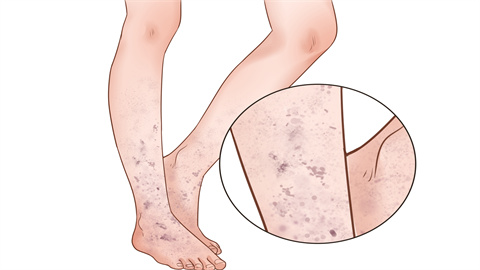What is the best diet for capillary dilation?
Under normal circumstances, capillary dilation can be improved by consuming foods such as blueberries, spinach, tomatoes, almonds, oranges, and others. Additionally, medications such as vitamin C tablets, rutin tablets, calcium dobesilate capsules, compound glycyrrhizin tablets, and mucopolysaccharide polysulfate cream may be taken under a doctor's guidance for regulation. Specific details are as follows:
1. Foods
1. Blueberries
Blueberries are rich in anthocyanins, which have antioxidant properties. These compounds can eliminate free radicals in the body, protect the elastic fibers of capillary walls, reduce vascular damage, delay the progression of capillary dilation, improve vascular permeability, and alleviate vascular congestion.

2. Spinach
Spinach contains abundant vitamin E and folic acid. Vitamin E protects vascular endothelial cells, prevents vascular aging and hardening, and enhances capillary resilience. Folic acid participates in red blood cell production, improves blood circulation, avoids poor blood flow that could burden capillaries, and helps maintain vascular health.
3. Tomatoes
The lycopene in tomatoes is a potent antioxidant that inhibits vascular inflammatory responses, reduces inflammation-induced capillary irritation, and also contains vitamin C, which promotes collagen synthesis, strengthens vascular wall structure, and reduces the occurrence of capillary dilation.
4. Almonds
Almonds are rich in unsaturated fatty acids and vitamin E. Unsaturated fatty acids help regulate blood lipids, preventing vascular damage caused by abnormal lipid levels. Vitamin E repairs damaged vascular endothelium, enhances capillary elasticity, and reduces vascular wall relaxation and dilation.
5. Oranges
Oranges are rich in vitamin C, which promotes collagen synthesis in the vascular walls, enhances capillary resilience, reduces vascular fragility, inhibits platelet aggregation, improves blood circulation, and decreases capillary dilation caused by poor blood flow.
2. Medications
1. Vitamin C Tablets
Vitamin C promotes collagen synthesis, enhances structural stability of capillary walls, reduces vascular permeability, alleviates redness and congestion caused by capillary dilation, and also inhibits oxidative reactions to protect vascular endothelial cells.
2. Rutin Tablets
Rutin belongs to the flavonoid family. It enhances capillary resistance, reduces capillary permeability and fragility, prevents vascular rupture and bleeding, and promotes the repair of damaged capillaries. It is suitable for capillary dilation accompanied by vascular fragility.
3. Calcium Dobesilate Capsules
Calcium dobesilate improves microcirculation, reduces capillary permeability, lowers blood viscosity, alleviates endothelial damage, and relieves discomfort caused by capillary dilation. It is commonly used to treat chronic venous insufficiency and capillary dilation.
4. Compound Glycyrrhizin Tablets
Compound glycyrrhizin has anti-inflammatory and anti-allergic effects. It inhibits the release of inflammatory factors, alleviates capillary inflammatory responses, reduces redness caused by inflammation, and regulates immunity, reducing the impact of external stimuli on blood vessels.
5. Mucopolysaccharide Polysulfate Cream
Mucopolysaccharide polysulfate promotes local blood circulation, alleviates vascular congestion, enhances capillary elasticity, inhibits thrombosis, and promotes tissue repair. It is suitable for topical regulation of localized cutaneous capillary dilation and can relieve skin redness and swelling.
In daily life, it is also important to maintain good habits and a positive mindset, avoid prolonged sun exposure and alternating hot and cold temperature stimulation on the skin, reduce consumption of spicy or irritating foods, avoid alcohol consumption, maintain skin cleanliness, and avoid using irritating skincare products. When necessary, seek timely medical attention and use medications under the guidance of a physician for treatment.









